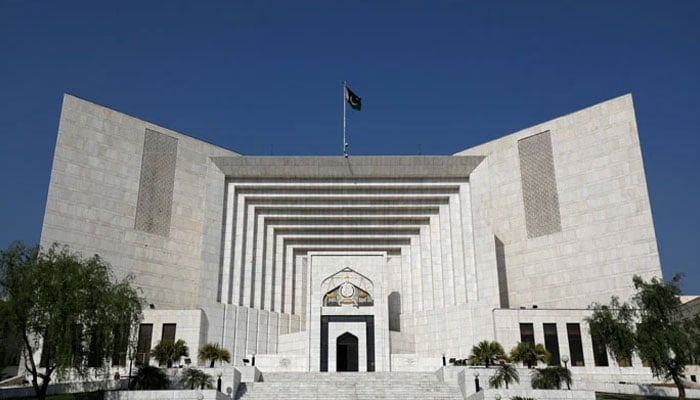Senate panel agrees on increasing number of SC judges
He said there has been an increase in suo motu cases and petitions filed under Article 184(3) of Constitution for enforcement of fundamental rights
ISLAMABAD: The Senate Committee on Law and Justice on Wednesday came to a consensus on an increase in the strength of judges in the Supreme Court after rationalising certain factors.
The committee met under Senator Farooq H Naek here at the Parliament House and discussed the Supreme Court Judges Amendment Bill 2023 (Section 2), introduced by Senator Fawzia Arshad as a private member bill.
The bill aimed to expedite justice delivery, particularly in cases of constitutional significance, emphasizing the public’s prolonged struggle with pending litigation despite substantial financial investments.
Highlighting the disparity between pending cases and judicial capacity, the mover debated the necessity of increasing the number of judges, citing the government’s temporary appointment of four judges as a pertinent example.
Federal Minister for Law and Justice Azam Nazir Tarar expressed the need for a review not only of judicial numbers but also of the code of standards governing the Supreme Court justices, emphasizing that judicial independence should not preclude accountability for performance.
Senator Anusha Rahman echoed these sentiments, advocating for a nuanced approach to assess the impact of judicial efficiency on case backlogs, independent of mere statistical analysis.
During the deliberations, pointing out work pressures and formation of separate constitutional courts, Senator Hamid Khan contended that setting up of constitutional courts would not solve the problem. Senator Zamir Hussain Ghumro argued for a balanced allocation of judges across the provinces.
Senator Abdul Qadir supported the bill, attributing the backlog of constitutional cases to preferential treatment of politically charged cases, proposing either an increased judicial cohort or the establishment of a separate constitutional court.
Farooq H Naek, while supportive in principle of augmenting the Supreme Court’s judicial strength, underscored the necessity for empirical evidence to substantiate any increase. He clarified that with the passage of time, the number of high court judges in the four provinces and Islamabad Capital Territory have increased, resulting in increase of judgments and orders passed by the high courts. “As a consequence, whereof number of appeals filed against judgements and orders of high courts have also increased the backlog and pendency of appeals in Supreme Court due to shortage of judges,” he said.
He said there has been an increase in suo motu cases and petitions filed under Article 184(3) of Constitution for enforcement of fundamental rights.
“All these factors have put pressure upon the present strength of Supreme Court judges, thus failing to meet the backlog despite their hard work in disposal of cases.” He said this fact was also responsible for the appointment of ad hoc judges in Supreme Court. “Thus to relieve pressure upon Supreme Court, it is the need of the day to increase the strength of judges from 17 to 21,” he said.
The bill was deferred for next meeting with the direction to the Ministry of Law and Justice to submit detailed statistics on pending cases, case resolutions over the past year, legislative workload in Supreme Court and number of increase in high court judges with an explanatory note as to the number of vacancies in the appointment of high court judges for the four provinces as well as Islamabad against the sanctioned strength.
The mover of the bill after discussion withdrew the amendment of one woman judge as mandatory and emphasized on merit-based appointments.
-
 Meghan Markle 'terrified' Over Possible UK Return
Meghan Markle 'terrified' Over Possible UK Return -
 Did Opiate Restrictions Lead To Blake Garrett's Death?
Did Opiate Restrictions Lead To Blake Garrett's Death? -
 Royal Expert Reflects On Princess Eugenie, Beatrice 'priorities' Amid Strained Relationship With Sarah, Andrew
Royal Expert Reflects On Princess Eugenie, Beatrice 'priorities' Amid Strained Relationship With Sarah, Andrew -
 Prince William's 'concerning' Statement About Andrew Is Not Enough?
Prince William's 'concerning' Statement About Andrew Is Not Enough? -
 50 Cent Gets Called Out Over Using Slur For Cardi B
50 Cent Gets Called Out Over Using Slur For Cardi B -
 Scientists Discover Rare Form Of 'magnets' That Might Surprise You
Scientists Discover Rare Form Of 'magnets' That Might Surprise You -
 Nancy Guthrie’s Kidnapper Will Be Caught Soon: Here’s Why
Nancy Guthrie’s Kidnapper Will Be Caught Soon: Here’s Why -
 AI Innovation Could Make Trade Secrets More Valuable Than Patents, Says Billionaire Investor
AI Innovation Could Make Trade Secrets More Valuable Than Patents, Says Billionaire Investor -
 King Charles Heckling: Calls For 10 BAFTAs And A Knighthood For Sign Language Interpreter
King Charles Heckling: Calls For 10 BAFTAs And A Knighthood For Sign Language Interpreter -
 Kim Kardashian Leaves Meghan Markle 'upset' With Latest 'cheap Shot'
Kim Kardashian Leaves Meghan Markle 'upset' With Latest 'cheap Shot' -
 Royal Expert On Andrew, Sarah Ferguson’s ‘entitled’ Behaviour Since Marriage
Royal Expert On Andrew, Sarah Ferguson’s ‘entitled’ Behaviour Since Marriage -
 Instagram And YouTube Accused Of Engineering Addiction In Children’s Brains
Instagram And YouTube Accused Of Engineering Addiction In Children’s Brains -
 Trump Reached Out To Police Chief Investigating Epstein In 2006, Records Show
Trump Reached Out To Police Chief Investigating Epstein In 2006, Records Show -
 Keke Palmer Praises Actor Who Inspired 'The Burbs' Role
Keke Palmer Praises Actor Who Inspired 'The Burbs' Role -
 Humans May Have 33 Senses, Not 5: New Study Challenges Long-held Science
Humans May Have 33 Senses, Not 5: New Study Challenges Long-held Science -
 Kim Kardashian Prepared To Have Child With Lewis Hamilton: 'Baby Using A Surrogate'
Kim Kardashian Prepared To Have Child With Lewis Hamilton: 'Baby Using A Surrogate'




